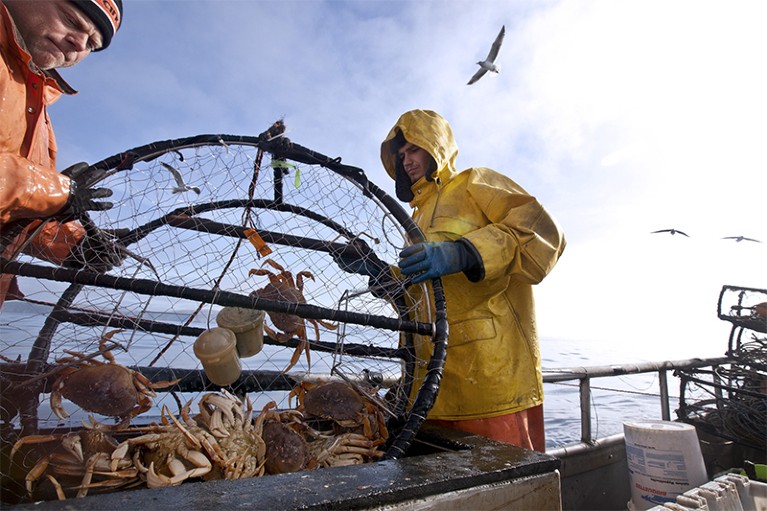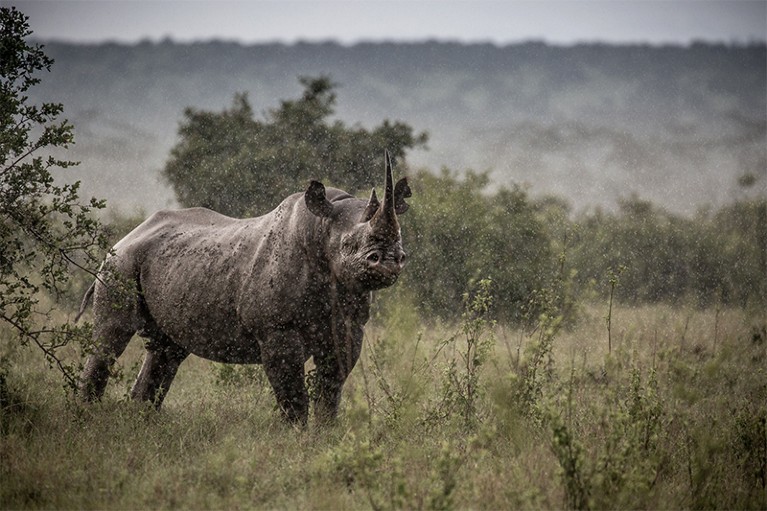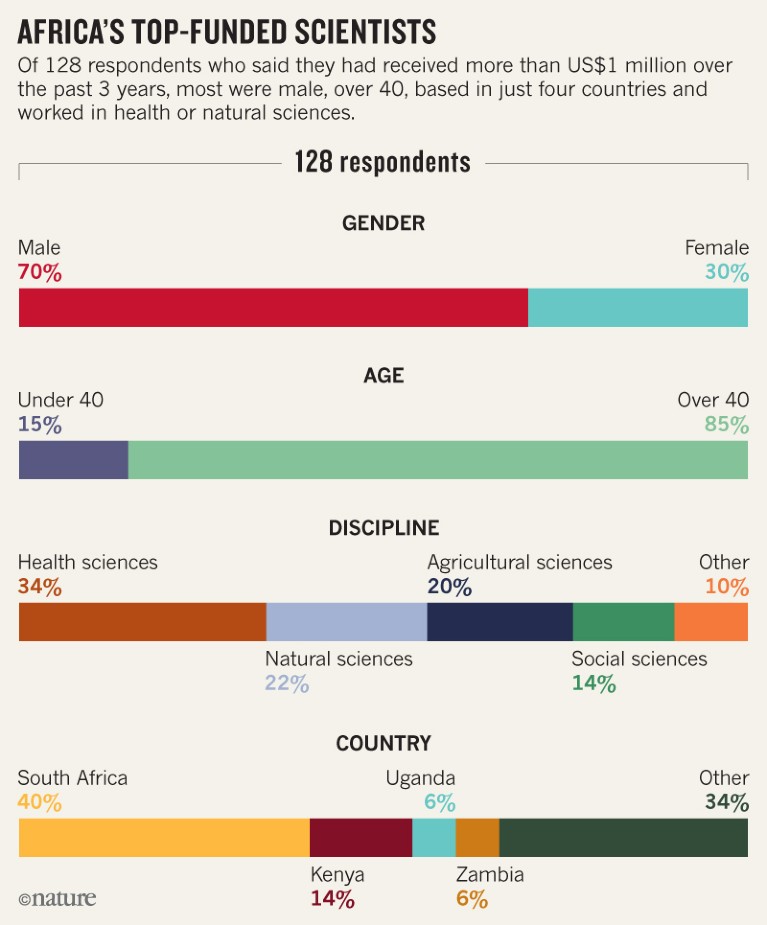EVENTS
Fishers sue over climate change A coalition of crab fishers along the US Pacific coast has sued 30 fossil-fuel companies, alleging that they are responsible for the global warming that has damaged coastal ecosystems and affected their livelihoods. The lawsuit, filed on 14 November by the Pacific Coast Federation of Fishermen’s Associations, says warming waters have spurred toxic algal blooms, shortened fishing seasons and even closed entire fisheries. The fishers are seeking economic compensation from companies including ExxonMobil, BP, Shell and Chevron. Sean Comey, a senior adviser at Chevron, said that the suit is “without merit and counterproductive to real solutions to climate change”. ExxonMobil, BP and Shell did not respond to Nature’s request for comment.

Two fisherman with crabs on a ship near Bodega Bay, California.Credit: Chip Chipman/Bloomberg via Getty
EVENTS
‘NIPS’ renamed The board that runs a leading machine-learning conference has decided to stop using the acronym commonly used to refer to the event — NIPS — after a long-running row over whether it is offensive. The annual meeting — the full name of which is Neural Information Processing Systems — will now go by the moniker NeurIPS. The change will be in force at the next meeting, which starts on 2 December in Montreal, Canada. The move comes after months of mounting pressure about the name and the hostile environment that some women say they have experienced at the event in the past. In April, the NIPS Twitter account said that the board would consider a name change, after around 120 academics from Johns Hopkins University in Baltimore, Maryland, signed a letter highlighting “disappointing behavior” at the 2017 event. The letter said that the “acronym of the conference is prone to unwelcome puns”. It gave examples such as an unofficial pre-conference event named TITS.
SPACE
Mars rover NASA will send its next Mars rover to Jezero crater, it said on 19 November. The site is a 45-kilometre-wide crater, once filled with water, where Martian life could have thrived. There, the US$2.4-billion rover will collect rock samples for eventual return to Earth by an as-yet-unplanned mission. Some scientists want NASA to send the 2020 rover to explore a second site called Midway, 28 kilometres from Jezero crater, where it could sample some of the most ancient rocks known on the red planet. Jezero beat several other potential destinations for the rover. They included Columbia Hills, which the Spirit rover explored between 2004 and 2011.
POLICY
France’s integrity France’s national research centre, the CNRS, announced plans on 13 November to create its first office of research integrity to investigate scientific misconduct and promote good research practice. The organization, Europe’s largest basic-research agency, has some 33,000 staff members, more than 1,000 laboratories and a budget of around €3.3 billion (US$3.8 billion). The office was established by CNRS president Antoine Petit and will be headed by theoretical physicist Rémy Mosseri of the agency’s Theoretical Physics of Condensed Matter Laboratory in Paris. Transparency of CNRS misconduct investigations is crucial, Petit said at a press conference. Researchers subject to misconduct investigations will be informed once any allegation is determined to be worth following up. Experts conducting investigations will be screened for potential competing interests. A national body, the French Office of Research Integrity, was created in 2017 to coordinate efforts across France’s research ecosystem, and will issue a road map of its plans next month.
Plagiarism problem A study that looked at nearly 500 papers in 100 Africa-based biomedical journals found that 63% contained some form of plagiarism (A. Rohwer et al. BMJ Open 8, e024777; 2018). The study, published on 8 November, sampled the papers from the database African Journals Online. The authors, led by Anke Rohwer, an epidemiologist at Stellenbosch University in Cape Town, randomly selected papers published in 2016 from each of the 100 journals and ran the final sample of 495 papers through plagiarism-checking software. They found extensive plagiarism — defined as when at least 4 linked sentences or more than 6 individual sentences had been copied — in 83 papers. They also found that only 26 of the 100 journals had a plagiarism policy on their website; just 16 stated that they used plagiarism software. The authors recommend raising awareness about plagiarism among academics, improving editorial practices and using anti-plagiarism software for journals.
Ban reinstated China has temporarily reinstated a ban on the use of the body parts of rhinoceroses and tigers in medicine, the government announced on 12 November. The nation’s cabinet had said in October that it would legalize the trade of the endangered species and their by-products for medicine, lifting a 25-year-old ban on the practice. This prompted an outcry from conservationists. In a statement, State Council official Ding Xuedong said that the move had been “postponed after study”, and that the government “has not changed its stance on wildlife protection”. The illicit trade of rhino horns and tiger bones is lucrative because they are sometimes used in traditional Chinese medicines.

A black rhino.Credit: Robin More/NG/Getty
RESEARCH
Parkinson’s trial Reprogrammed cells have been implanted into the brain of a patient with Parkinson’s disease for the first time. Japanese neurosurgeons announced last week that they had created a therapy using induced pluripotent stem (iPS) cells; these are developed by reprogramming the cells of body tissues such as skin so that they revert to an embryonic-like state, from which they can morph into other cell types. Scientists at Kyoto University transformed iPS cells into precursors to the neurons that produce the neurotransmitter dopamine. A shortage of these neurons in people with Parkinson’s disease can lead to tremors and difficulty walking. In October, a team led by neurosurgeon Takayuki Kikuchi at Kyoto University Hospital implanted 2.4 million dopamine precursor cells into 12 sites in the brain of a patient in his 50s. The scientists say they will observe the patient for six months and, if no complications arise, will implant another 2.4 million dopamine precursor cells into his brain. The team plans to treat six more patients with Parkinson’s disease to test the technique’s safety and efficacy by the end of 2020.
Crisis in psychology A large-scale effort to replicate results in psychology research has rebuffed claims that failures to reproduce social-science findings might be down to differences in study populations. The drive recruited labs around the world to try to replicate the results of 28 classic and contemporary psychology experiments, drawing study samples from 60 different labs. Only half of the experiments were reproduced successfully using a strict threshold for significance set at P < 0.0001 (the P value is a test for judging the strength of a result). Studies that did not replicate varied little across samples, debunking a common theory for failure (R. A. Klein et al. Preprint at PsyArXiv http://doi.org/cw63; 2018).
AWARDS
China prize Fifty early- and mid-career scientists in China will be awarded generous research grants under a new privately funded programme. Tencent, the Shenzhen-based communications giant, announced on 9 November that it will invest an initial 1 billion yuan (US$144 million) in the Xplorer Prize for researchers aged under 45. Winners will be selected annually by a committee of Chinese science leaders and will receive 600,000 yuan each year for 5 years. The 50 prizes will be awarded across 9 categories, including physics, mathematics, life sciences and energy. The award is intended to give scientists a say in choosing the most promising directions for future research. Some Chinese government awards have been criticized for political interference, and for being based on past accomplishments rather than future potential. The first winners will be announced in July 2019.
TREND WATCH
Africa’s research system has created few well-funded scientists: only 2% or so of them from just a handful of countries and fields report receiving more than US$1 million in grants over a three-year period. Meanwhile, almost half did not report receiving any research funding. Those best-funded scientists tend to work in fields and countries that rely most heavily on financing from agencies based in Europe, the United States and China, which still dominate research funding in Africa, says a report published on 6 November, called The Next Generation of Scientists in Africa. The report is based on a four-year international study jointly funded by the Robert Bosch Stiftung foundation in Germany and the International Development Research Centre in Ottawa, Canada.
The authors surveyed 5,700 African researchers between May 2016 and February 2017 and analysed papers listed in the Web of Science that had authors at African institutes and were published from 2005 to 2016. Scientists’ median funding over the three years before the survey was just $5,000, although 128 researchers reported receiving more than $1 million.

Source: The Next Generation of Scientists in Africa, 2018.



